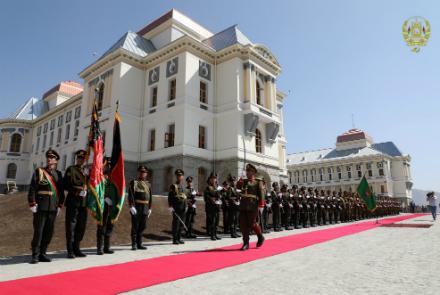Afghans across the country celebrated 100th Independence Day by holding gatherings in different provinces, mainly in Helmand, Balkh, Herat, Kabul, and Nangarhar.
President Ashraf Ghani laid a wreath at the Azadi Memorial minaret on Independence Day before appearing at a ceremony at Darul Aman Palace.
Mr. Ghani said the main celebration of the centenary of Independence Day was postponed to honor the victims of the deadly attack but added that “we will take the revenge of our people”.
“We will eliminate Daesh hideouts all around the country. The fight against Deash will be intensified,” the president said.
At least 63 people were killed, and more than 180 others were wounded in the attack which happened inside the wedding hall where 1,200 guests were attending.
People from different parts of the country stressed the need for stepping up security.
“Security is not proper. There is no peace. We want a safe environment to celebrate Independence Day,” said Latif Nazari, a Kabul resident.
“We want a peaceful Afghanistan. We live with this hope,” said Haji Lala, a Khost resident.
The day is celebrated on August 19 every year.
Although Afghanistan was never part of the British Empire, it gained its independence from Britain after the signing of the Anglo-Afghan Treaty in 1919 – a treaty that granted complete neutral relations between Afghanistan and Britain.
And although not having been part of the British Empire, Britain fought three wars in the country.
The First Anglo-Afghan War (1839-1842) led to the defeat of the entire British-led Indian invaders by Afghan forces under Abdur Akbar Khan. The Second Anglo-Afghan War (1878-1880) first saw the British defeated in the Battle of Kandahar only for them to emerge victors – which led to Abdur Rahman Khan becoming the new emir.
This ushered in a new era of friendly British-Afghan relations. Following this war, the British were given control of Afghanistan's foreign affairs in exchange for protection against the Russians and Persians.
In 1901 Abdur Rahman Khan's son, Habibullah, succeeded him.
Habibullah was a relatively reform-minded ruler who attempted to modernize his country. During his reign, he worked to bring modern medicine and other technology to Afghanistan and worked to put in place progressive reforms in his country.
He was assassinated while on a hunting trip in Laghman Province on February 20, 1919. His brother Nasrullah Khan briefly succeeded him as emir and held power for a week before being ousted and imprisoned by Amanullah Khan, Habibullah's third son.
However, the third Anglo-Afghan War started the same year and resulted in the British giving up control of Afghanistan's foreign affairs in 1921.
Within a few months, the new emir had gained the allegiance of most tribal leaders and established control over the cities.
Amanullah's ten years of reign initiated a period of dramatic change in Afghanistan in both foreign and domestic politics. Starting in May 1919 when he won complete independence in the month-long Third Anglo-Afghan War with Britain, Amanullah altered foreign policy in his new relations with external powers and transformed domestic politics with his social, political, and economic reforms.
Although his reign ended abruptly, he achieved some notable successes.
Before final negotiations were concluded in 1921 on the foreign policy issue, however, Afghanistan had already begun to establish its own foreign policy, including diplomatic relations with the new government in the Soviet Union in 1919.
During the 1920s, Afghanistan established diplomatic relations with most major countries, and Amanullah officially became king in 1923.
On 14 January 1929, Amanullah abdicated and fled to neighboring British India while Afghanistan fell into a civil war. From British India, he went to Europe where he died in Zürich, Switzerland, in 1960.


